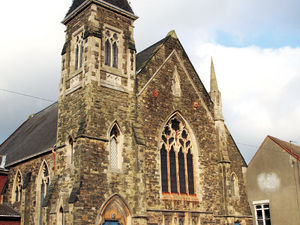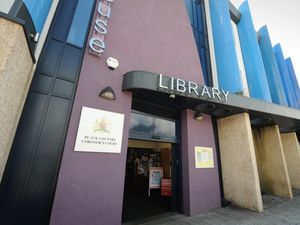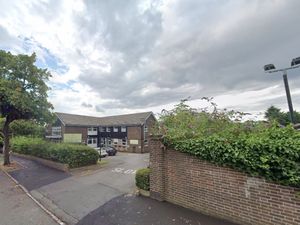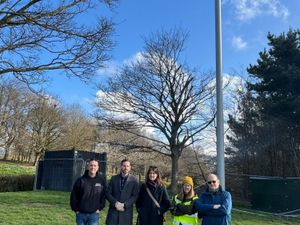We're lovin' it at the school of McDonald's
McDonald's has launched a new qualification said to be equivalent to a GCSE. Mark Andrews sees if he has what it takes to get a McO-level.
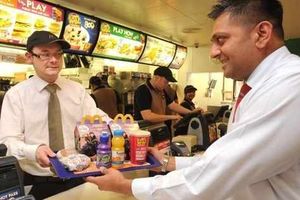
McDonald's has launched a new qualification said to be equivalent to a GCSE. Mark Andrews sees if he has what it takes to get a McO-level.
A MESSAGE flashes up on the television screen above us. Well actually there are four messages, but let's not get too ambitious.
"One squirt each with the gun, two pickles, not touching one another, a sprinkling of onions," says Abdul Sirkhot, as he teaches me how to prepare a cheeseburger. "Oh, and it's two slices of cheese because it is a double."
The fruits of my labour are swiftly handed to a lady who has just grilled two beefburgers, as further instructions are issued and more televised messages appear above.
"Communication and teamwork in vital," says Abdul, who owns the franchise of the McDonald's in Wolverhampton's Penn Road. "It's like an assembly line, everyone has their job, and everyone needs to know what each other is doing."
Assembling the toppings for the cheeseburgers is one of the many tasks schoolchildren will be asked to perform if they are to complete the new McDonald's vocational qualification, which will doubtless become known as the McO-level.
Actually it is not just schoolchildren. Anybody in full-time education between the ages of 14 and 19 will be able to take part in the 10-day training scheme, which is rated by the examining board Edexcel as equivalent to a GCSE grade B or C.
But there is no doubt that many of those taking part will be youngsters in their last two years at school, who will incorporate the scheme as part of their education. And for those who are really serious about gaining an education in the world of Big Macs and McFlurrys, there is also a full apprenticeship scheme resulting in a level two NVQ qualification, said to be the equivalent of five O-levels.
Not anybody can get on the scheme though. Candidates for the work experience programme will first of all be asked to fill in an application form on the website www.McDonalds. co.uk/careers where they will first be asked to carry out a series of psychometric tests to assess their suitability.
On completing that, those selected will be invited to come into a branch and chat with a manager, as well as sit a one-hour test relating to health and safety and food hygiene.
And you do learn a thing or two about cleanliness. You are not allowed to scratch your head, which could potentially create a risk of food poisoning - perhaps the compulsory baseball hats are more than simply a uniform - and strong aftershaves are also a no-no, apparently presenting a risk of food contamination. A splash of Hai Karate is out of the question, then.
The trainees will also be expected to work behind the counter and, where appropriate, on the drive-through counter. The hardest part is trying to keep up with what is going on. Everything moves at break-neck speed; the moment the order, for say a Big Mac, a team of around half a dozen people will start working on it, one selecting the bread, another applying the dressings and placing it in a box. It will then be handed to the burger cook, while somebody else is cooking the fries.
By the time it has reached the counter, the crew member at the start of the production line will have probably taken two or three new orders.
In a typical week the branch in Penn Road, the 80-strong workforce will churn out 2,100 Big Macs and 6,200 standard burgers. It is no surprise then that Abdul is a man who seems to do everything quickly; he talks fast, thinks fast, moves fast.
He is also a proud, real-life embodiment of the old joke: "What do you say to a university graduate with a job? Big Mac and Fries please".
He first worked for the company while studying for his A-levels in London, and then get a job at the Walsall branch in 1982 while studying electrical engineering at Aston University.
"After graduating the following year, I was looking for a job in electrical engineering, but there was nothing about, so I got stuck into the management side of McDonald's," he says.
"My family, because I had got a degree, weren't sure about me going into McDonald's management. They said 'are you sure this is what you want to do considering the level of education you have got?'
"But I became a restaurant manager within a year, and I wanted to own my own business."
Actually, Penn Road is just one of 11 McDonald's restaurants now owned by the 47-year-old. He has four others in Wolverhampton, including the city centre branch in Dudley Street, one in Willenhall, four in Dudley and another in Birmingham. He employs 700 people across his mini empire, but you are as likely as not to see him working in the kitchen or behind the counter.
"I do that for two reasons," he says. "I do it to keep my hand in, but it also shows the crew members what can be achieved."
Has his business made him a McMillionaire?
He reclines in the chair in his basement office, and pauses for thought. "I don't think so, not yet. But that is the intention."
His old school friends are impressed by his success.
"I'm in touch with about half a dozen of them. They all went off to university and got good jobs, some went on to work for BT, some went to work in financial services. But owning 11 McDonald's has to be considered a fair bit of success."
Indeed it does.
McDonald's will have its work cut out convincing the sceptics about the prospect of an O-level in burger making. But at the same time, Abdul Sirkhot is living proof that, for enterprising and hard working young people, there are opportunities for hard working and enterprising young people who are willing to look further than the snobbery about vocational qualifications.
The paradox is that while the Government talks about a desire for half of all school leavers to go on to higher education, it takes a university graduate to demonstrate that academic qualifications are not the only route to success.

